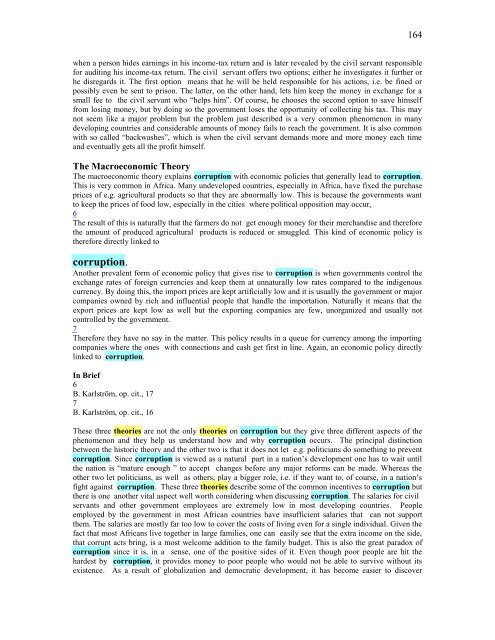FILSAFAT KORUPSI - Direktori File UPI
FILSAFAT KORUPSI - Direktori File UPI
FILSAFAT KORUPSI - Direktori File UPI
Create successful ePaper yourself
Turn your PDF publications into a flip-book with our unique Google optimized e-Paper software.
164<br />
when a person hides earnings in his income-tax return and is later revealed by the civil servant responsible<br />
for auditing his income-tax return. The civil servant offers two options; either he investigates it further or<br />
he disregards it. The first option means that he will be held responsible for his actions, i.e. be fined or<br />
possibly even be sent to prison. The latter, on the other hand, lets him keep the money in exchange for a<br />
small fee to the civil servant who ―helps him‖. Of course, he chooses the second option to save himself<br />
from losing money, but by doing so the government loses the opportunity of collecting his tax. This may<br />
not seem like a major problem but the problem just described is a very common phenomenon in many<br />
developing countries and considerable amounts of money fails to reach the government. It is also common<br />
with so called ―backwashes‖, which is when the civil servant demands more and more money each time<br />
and eventually gets all the profit himself.<br />
The Macroeconomic Theory<br />
The macroeconomic theory explains corruption with economic policies that generally lead to corruption.<br />
This is very common in Africa. Many undeveloped countries, especially in Africa, have fixed the purchase<br />
prices of e.g. agricultural products so that they are abnormally low. This is because the governments want<br />
to keep the prices of food low, especially in the cities where political opposition may occur.<br />
6<br />
The result of this is naturally that the farmers do not get enough money for their merchandise and therefore<br />
the amount of produced agricultural products is reduced or smuggled. This kind of economic policy is<br />
therefore directly linked to<br />
corruption.<br />
Another prevalent form of economic policy that gives rise to corruption is when governments control the<br />
exchange rates of foreign currencies and keep them at unnaturally low rates compared to the indigenous<br />
currency. By doing this, the import prices are kept artificially low and it is usually the government or major<br />
companies owned by rich and influential people that handle the importation. Naturally it means that the<br />
export prices are kept low as well but the exporting companies are few, unorganized and usually not<br />
controlled by the government.<br />
7<br />
Therefore they have no say in the matter. This policy results in a queue for currency among the importing<br />
companies where the ones with connections and cash get first in line. Again, an economic policy directly<br />
linked to corruption.<br />
In Brief<br />
6<br />
B. Karlström, op. cit., 17<br />
7<br />
B. Karlström, op. cit., 16<br />
These three theories are not the only theories on corruption but they give three different aspects of the<br />
phenomenon and they help us understand how and why corruption occurs. The principal distinction<br />
between the historic theory and the other two is that it does not let e.g. politicians do something to prevent<br />
corruption. Since corruption is viewed as a natural part in a nation‘s development one has to wait until<br />
the nation is ―mature enough ‖ to accept changes before any major reforms can be made. Whereas the<br />
other two let politicians, as well as others, play a bigger role, i.e. if they want to, of course, in a nation‘s<br />
fight against corruption. These three theories describe some of the common incentives to corruption but<br />
there is one another vital aspect well worth considering when discussing corruption. The salaries for civil<br />
servants and other government employees are extremely low in most developing countries. People<br />
employed by the government in most African countries have insufficient salaries that can not support<br />
them. The salaries are mostly far too low to cover the costs of living even for a single individual. Given the<br />
fact that most Africans live together in large families, one can easily see that the extra income on the side,<br />
that corrupt acts bring, is a most welcome addition to the family budget. This is also the great paradox of<br />
corruption since it is, in a sense, one of the positive sides of it. Even though poor people are hit the<br />
hardest by corruption, it provides money to poor people who would not be able to survive without its<br />
existence. As a result of globalization and democratic development, it has become easier to discover

















